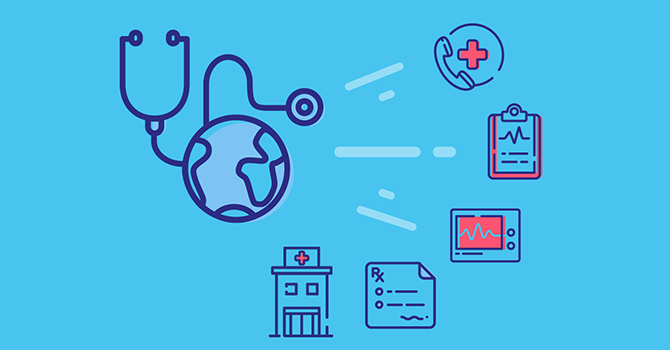Health
How to Build Resilient and Strong Healthcare Systems

Oscar L Kashala – a politician in the Democratic Republic of the Congo and a candidate in the 2006 presidential election- equips a platform of discussion on innovative solutions and methods to improve the resilience of health systems in a financially tolerable way during these unsettled times.
Oscar graduated from Kinshasa University Medical School in 1980, completing honors and training in internal medicine along with pathology at the University of Kinshasa. Later at the University of Lausanne and the University of Geneva Medical Schools. He is a physician with an international reputation and a high level of compassion bent on ensuring people get the support and dignity they deserve through social medicine.
In 1986, the World Health Organization (WHO/AFRO) awarded him a fellowship for medical oncology in Boston. Then he obtained a company in cancer biology at Harvard University, Boston. This was followed by admission into a doctoral program in cancer biology and immunology in a combined degree program (Harvard University and Massachusetts Institute of Technology). He received a Doctor of Science degree from Harvard University in 1992.
His other ventures include “Afrigentech Company Limited” in Drug Discovery, innovative Pharmaceutical Research and Development, and molecular diagnostics. Afrigentech is a clinical-stage biopharmaceutical company and a healthcare systems corporation that focuses on research and development (R&D) and manufacturing innovative pharmaceutical products from natural sources for human and animal health in emerging markets of Africa.
In light of this remarkable health concern, all countries have ramped up measures to mitigate the pressure on their healthcare systems. Countries have strengthened access to health care, emphasizing the importance of high-quality universal health coverage. The situation has revealed the extent of versatile health systems.
While another common challenge to effective governance is a lack of resources, which can include financial resources and human capital; when an organization needs more resources to support its governing body, it can be challenging to achieve success. Fortunately, there are ways to overcome these challenges and build an effective system of governance. By clearly defining roles and responsibilities, maintaining commitment among all members of the governing body, and ensuring adequate resources, organizations can set themselves up for success.
Oscar has always put people first: The health, safety, and welfare of the citizens of the Congo is the first job of the government, and the goal is to achieve maximum performance on the human capital index, record economic growth, and creation a true middle class ensuring social up mobility for the yet forgotten, voiceless, destitute, and the abandoned.
Oscars government promises to reform the health care system and deliver world-class and efficient services to every city, town, and village of the New Congo. There are key unmet medical needs that his government says will be at the forefront of our public health governance, especially psychological trauma related to armed conflicts, maternal-child health, major communicable and non-communicable diseases such as diabetes, cardiovascular diseases, cancer. We will establish nationwide centers for prevention, detection, monitoring, and control of pandemics outbreaks and strengthen global health security

Health
Ketamine Therapy: A Path to Healing

Ketamine therapy is a hopeful treatment alternative for mental health concerns such as anxiety, PTSD, and depression. Unlike traditional treatments, ketamine works rapidly by affecting neurotransmitters linked to mood regulation. Administered in controlled medical settings, it has shown effectiveness for individuals resistant to conventional therapies. Patients often experience significant relief after just a few sessions, with benefits including improved mood, reduced suicidal thoughts, and enhanced emotional resilience. Regular monitoring and follow-up care ensure safety and long-term effectiveness. While not a one-size-fits-all solution, ketamine therapy provides hope for those seeking alternative treatments. With continued research and careful administration, it is a transformative option for mental health healing and improved quality of life.
What is Ketamine Therapy?
In recent years, Ketamine Therapy in Utah has been at the forefront of revolutionary treatments for mental health disorders. Initially deployed as a potent anesthetic during surgeries, ketamine’s role has astonishingly expanded in the medical field. Its unique mechanism provides relief to individuals coping with depression, anxiety, and PTSD, notably those who have not benefitted from standard interventions. This therapy represents a beacon of hope, offering life-changing possibilities for patients who have encountered a dead-end with traditional antidepressants.
This innovative application of ketamine as a therapeutic agent highlights the evolving landscape of mental health care. Straying from conventional pharmacotherapy, ketamine is pioneering a renewed focus on rapid recovery, especially vital for those in desperate need of immediate relief. The accessibility of this treatment underscores the importance of adapting and broadening mental health approaches to meet diverse patient needs more effectively.
How Does Ketamine Work?
The primary way that ketamine works to treat mood disorders is by interacting with the brain’s NMDA receptor, which is essential for mood regulation and synaptic plasticity. Unlike traditional antidepressants that often require prolonged periods to manifest effects, ketamine can initiate rapid symptom relief. This fast-acting quality is particularly valuable for patients who may be experiencing acute episodes of depression or suicidal ideation, where timely intervention is crucial for altering life-threatening situations.
The intricate workings of ketamine provide insight into its potential beyond currently available treatments. By influencing the brain’s neural pathways directly, ketamine offers a unique approach to managing complex mental health issues. If readers want to learn more about how ketamine affects brain function and how it affects mental health therapies, the resource on how ketamine might help depression offers a comprehensive exploration of its biochemical impact.
The Benefits of Ketamine Therapy
- Rapid Relief: Ketamine is recognized for its fast-acting properties in reducing symptoms of major depressive disorders and anxiety, often providing relief within hours rather than weeks, as seen with traditional antidepressants. When other therapies have failed, this quick effect is beneficial for those who are in extreme distress or contemplating suicide since it provides them with instant relief. By targeting glutamate pathways in the brain, ketamine helps restore neural connections, improving mood and cognitive function. This quick response can be life-changing for patients in crisis, granting them hope and stability while long-term treatment strategies are developed. Its potential as a breakthrough therapy continues to drive research and clinical interest.
- Reduction in Suicidal Thoughts: One of ketamine’s most significant advantages is its ability to reduce suicidal ideations, making it a vital tool in addressing severe mental health crises. In contrast to conventional antidepressants that can take weeks to be effective, ketamine is known to deliver quick mood improvements, typically within hours. This fast-acting relief provides a critical window for individuals in distress, allowing mental health professionals to implement broader therapeutic interventions, such as counseling and long-term medication strategies. Studies suggest that ketamine’s impact on brain chemistry helps regulate mood and alleviate severe depressive symptoms, offering hope and immediate support for those at high risk of self-harm or suicide.
- Minimal Side Effects: Initially recognized mainly as a potent anesthetic, ketamine has gained attention for its therapeutic benefits in mental health treatment. It has been discovered to have fewer serious adverse effects than many conventional antidepressants when taken at carefully monitored dosages, which makes it a more bearable choice for a large number of people. Unlike traditional medications that often lead to weight gain, sexual dysfunction, or emotional blunting, ketamine’s side-effect profile is generally milder. This reduced burden allows individuals to focus on their recovery without the added distress of managing uncomfortable medication-induced symptoms. As a result, patients may experience a more positive and sustainable treatment journey with improved overall well-being.
The broad spectrum of benefits associated with ketamine therapy stands as a testament to its role as a transformative treatment in mental health. By offering an alternative pathway to resilience and recovery, ketamine is rewriting the narratives traditionally associated with mental health treatment, providing a much-needed spark of hope for those feeling trapped by their conditions.
Who Can Benefit from Ketamine Therapy?
For those who have tried conventional treatment options without sufficient results, ketamine therapy is beneficial. It has shown promise for patients experiencing treatment-resistant depression, severe anxiety, PTSD, and, sometimes, chronic pain. Each individual’s response to ketamine can vary, often requiring a medical evaluation to determine appropriateness and to tailor treatments correctly. This highlights the importance of personalized care plans, which help maximize therapeutic outcomes.
Decisions around ketamine therapy must be informed by professional assessments, paving the way for a personalized approach that ensures patients can reap maximum benefits from this innovative treatment. By acknowledging unique patient needs and histories, ketamine therapy exemplifies the movement toward individualized mental health care.
Success Stories
The transformative power of ketamine therapy is illuminated through powerful testimonials from individuals who have experienced its benefits firsthand. For many patients, ketamine has facilitated a return to a fulfilling and hopeful life—an outcome that seemed unattainable through more conventional means. These success stories emphasize the profound clinical improvements observed and the psychological upliftment they provide, restoring hope and vitality to those who have long struggled.
Such narratives paint a compelling picture of ketamine therapy’s potential and offer inspiration to those still seeking effective treatment options. To explore these personal transformations, readers can refer to the success stories documented by renowned publications like Psychology Today that showcase the real-world impact of ketamine.
Potential Risks and Side Effects
Despite its promising benefits, ketamine therapy is not devoid of risks, which behooves a cautious and informed approach. Common side effects can include sensations of dissociation, temporary increases in blood pressure, and, in some rare cases, the potential for developing dependency. To mitigate these risks, ketamine treatment must be administered, monitored, and supervised by qualified healthcare practitioners in a controlled setting.
Vigilant oversight and professional care during administration ensure that ketamine’s therapeutic potential can be safely tapped. By carefully balancing its benefits against possible drawbacks, healthcare providers can optimize treatment efficacy while safeguarding patient well-being.
Getting Started with Ketamine Therapy
- Consultation: The first step in the process is an extensive consultation with a licensed mental health specialist, during which they assess the patient’s symptoms, medical background, and treatment objectives. Based on the person’s unique mental health state, this evaluation aids in determining whether ketamine therapy is a good choice. The expert considers past treatments, potential risks, and overall well-being to ensure the therapy aligns with the patient’s needs, providing a safe and effective approach to mental health care.
- Professional Administration: Ketamine treatment should be managed by highly trained clinicians with in-depth knowledge of its medical applications, effects, and potential risks. Their expertise ensures precise dosing, appropriate patient monitoring, and adherence to safety protocols. Proper oversight minimizes complications, enhances treatment effectiveness, and ensures patient well-being. By following established administration guidelines, experienced professionals can maximize ketamine’s therapeutic benefits while mitigating any adverse effects, providing patients with a safe and controlled treatment experience.
- Follow-up Care: Ongoing therapy sessions and regular follow-ups are crucial in tracking patient progress, identifying improvements or setbacks, and refining treatment plans. These sessions provide a structured approach to addressing evolving patient needs, ensuring timely interventions and personalized care. Additionally, consistent follow-ups foster a strong support system, reinforcing treatment adherence and promoting overall well-being. By prioritizing continuous monitoring, healthcare providers enhance patient safety, optimize outcomes, and contribute to long-term recovery and stability.
Embarking on ketamine therapy requires a commitment to structured and professional management, which underpins a successful therapeutic experience and fosters effective long-term outcomes. These steps ensure a supportive path toward mental wellness, paving the way for hope and healing.
Future of Ketamine Therapy
As research into ketamine therapy advances, its potential utility in mental health treatment continues to grow. Emerging studies are uncovering new applications and refining their role in clinical settings. The progressive understanding of its mechanisms and broader applicability indicates a promising outlook on ketamine becoming a staple in treatment paradigms for complex mental illnesses. This evolution suggests a significant paradigm shift in addressing mental health challenges, representing a beacon of hope for those seeking innovative solutions.
Keen interest from the medical and scientific community signals an optimistic future for ketamine therapy in redefining treatment standards and expanding mental health care frontiers. By building upon current insights, healthcare professionals continue to explore ways to harness ketamine’s full potential, offering brighter prospects for all impacted by mental health disorders.
Health
The Link Between Stress Fractures and Daily Routines Addressed by a Foot and Ankle Specialist

Stress fractures might sound like something only athletes deal with, but everyday routines can play a big role in their development. Whether it’s standing for hours at work or pushing through a long walk in the wrong shoes, your feet can take a beating. That’s where insights from a foot and ankle specialist come in handy, helping you spot trouble early and keep your feet healthy.
Understanding How Repetitive Strain Impacts Bone Health
Your bones are incredibly strong, but they aren’t indestructible. Repeated stress from daily activities like walking, standing, or running can weaken the tiny structures within the bone, leading to stress fractures. Unlike traumatic injuries, these fractures develop gradually, making them harder to detect without professional help.
A foot and ankle specialist can assess how your routines contribute to stress on your bones and recommend changes to reduce that strain. They’ll consider factors like footwear, activity levels, and even how your body mechanics affect the distribution of weight on your feet. By addressing these details, you can avoid long-term damage while staying active and comfortable.
Identifying Common Daily Activities That Contribute to Stress Fractures
Some everyday habits put more pressure on your feet than you might think. For example, standing for long hours on hard surfaces or walking on uneven ground can subtly but consistently wear down your foot bones. Even carrying heavy items regularly, like groceries or work equipment, increases the load on your feet, making them more prone to stress fractures.
A foot and ankle specialist near me can help pinpoint the specific activities in your routine that might be causing issues. They don’t just stop at identifying the problem—they provide actionable solutions, such as adjusting your posture, using supportive footwear, or incorporating rest periods into your day. These small changes can make a big difference in preventing fractures and improving foot health.
Evaluating the Impact of Standing or Walking for Extended Periods
For those whose jobs require them to stand or walk for most of the day, stress fractures are a common risk. Prolonged periods of standing can compress the bones in your feet, while continuous walking puts repetitive strain on the same areas. Over time, this can lead to tiny cracks that, if ignored, worsen into painful fractures.
A foot and ankle specialist will examine your work environment and daily habits to determine how they impact your foot health. They might suggest shock-absorbing insoles, breaks to elevate your feet, or even exercises to strengthen the muscles supporting your arches. These tailored recommendations go a long way in keeping your feet resilient despite demanding routines.
Recognizing the Signs of Overuse in High-Impact Routines
High-impact activities like jogging, sports, or fast-paced work can significantly strain your feet and ankles. Stress fractures often start with subtle symptoms—maybe a persistent ache or tenderness in a specific area. These are easy to dismiss until the pain becomes severe, at which point recovery may take longer.
Seeing a foot and ankle specialist near me early can help identify these warning signs and address them before they escalate. Specialists use advanced imaging and assessments to uncover hidden fractures or weaknesses. With early detection, you can make necessary adjustments to your routine and avoid prolonged downtime from your favorite activities.
Addressing Improper Posture and Its Effect on Foot Stress
Poor posture doesn’t just affect your back or shoulders—it also changes how weight is distributed across your feet. If your posture causes uneven pressure, certain parts of your feet bear more load than they’re designed for, increasing the likelihood of fractures. This is especially true if you’re on your feet for long stretches without supportive footwear.
A foot and ankle specialist can evaluate your posture and identify any misalignments contributing to foot stress. They might recommend posture corrections, orthotics, or exercises that improve alignment and reduce unnecessary strain. These adjustments not only prevent fractures but also improve overall comfort and mobility.
Exploring Recovery Strategies for Work-Related Stress Injuries
If you’ve already experienced a stress fracture, recovery can be tricky while managing a busy work schedule. Rest is essential, but there are other steps you can take to heal faster and reduce the chance of re-injury. Treatments like custom braces, physical therapy, or gradual return-to-activity plans can make the process smoother.
A foot and ankle specialist will create a personalized recovery plan that fits your lifestyle. Whether it’s helping you stay mobile with the right support or advising on ways to adjust your routine temporarily, their expertise ensures you get back on your feet—literally—without risking further damage.
Offering Preventative Care Solutions for Active Lifestyles
Staying active is important, but it also increases the need for preventative care to keep your feet healthy. Regular check-ins with a foot and ankle specialist can catch early signs of trouble before they turn into stress fractures. Preventative strategies might include proper warm-ups, choosing the right footwear, or strengthening exercises tailored to your activities.
By working with a foot and ankle specialist near me, you can maintain your active lifestyle while reducing the risks of injuries. Preventative care doesn’t just keep you pain-free—it also enhances your performance and overall well-being, ensuring your daily routines and hobbies remain enjoyable and stress-free.
Health
Tips for Making the Most of Your Physical Therapy Sessions

Embarking on the journey of physical therapy can be a pivotal step towards regaining mobility and improving your quality of life. Whether recovering from an injury or managing a chronic condition, consulting a physical therapist Davie, FL can provide your needed expertise and support. Even though therapy sessions provide structured direction, how you approach and use these opportunities will determine how successful you are. Your therapeutic experience can be greatly improved by comprehending and putting the appropriate tactics into practice.
In this comprehensive guide, we’ll outline key tips to help you maximize the benefits of your physical therapy sessions. We’ll explore the importance of preparing for appointments, setting realistic goals, and maintaining consistency. Also, we will talk about how external resources and innovations in the field can help you move forward. From beginners to seasoned therapy participants, these tips ensure you make the most of your time with your therapist.
Key Takeaways:
- Effective preparation and active participation can significantly enhance the outcomes of your physical therapy sessions.
- Setting reasonable goals and keeping lines of communication open with your therapist are essential for long-term improvement.
- External resources and technological advancements can support your physical therapy journey.
Table of Contents:
- Prepare for Your Sessions
- Set Realistic Goals
- Engage Actively During Sessions
- Follow Through with Home Exercises
- Communicate Openly with Your Therapist
- Utilize External Resources
- Stay Consistent
- Embrace Technology in Therapy
Prepare for Your Sessions
Preparation is key to any successful endeavor, and physical therapy is no exception. Before each session, take a few moments to assess your current physical state and note any improvements or setbacks you’ve experienced since the last visit. Wear comfortable clothing that allows free movement and ensures your therapist can easily assess your form. During therapy sessions that emphasize exercise, staying hydrated and eating a small snack might help you stay energized.
Set Realistic Goals
Goal setting is an important aspect of physical therapy, providing a roadmap for your recovery journey. Collaborate with your therapist to establish short, medium, and long-term objectives that are both challenging and attainable. This ensures you have measurable milestones to work towards, keeping you engaged and motivated. Often, achieving these incremental goals can lead to significant improvements in mobility and function over time.
Engage Actively During Sessions
Physical therapy sessions are the prime time to learn and refine techniques to aid your recovery. Engage actively by asking questions and seeking clarity on exercises or processes you don’t fully understand. It is possible to speed up recuperation and enhance results by displaying a sincere interest in and dedication to learning the proper form and function during exercises. Remember, the more you put into each session, the more you gain.
Follow Through with Home Exercises
Home exercises prescribed by your therapist are vital to your rehabilitation process. They complement what you do in therapy sessions, ensuring continued progress between visits. Consistency in practicing these exercises will reinforce the skills you learn and help embed them into your daily routine, effectively accelerating your recovery process.
Communicate Openly with Your Therapist
An open line of communication with your therapist is crucial for effective therapy. Share feedback about what’s working for you and what isn’t, along with any concerns or new symptoms that may arise. This information is invaluable for your therapist, allowing them to tailor your treatment plan accurately. A healthy patient-therapist relationship can significantly enhance the therapeutic alliance, promoting better outcomes.
Utilize External Resources
Beyond your therapy sessions, numerous external resources are available that can complement and enhance your rehabilitation. These can include online exercise guides, communities sharing experiences, or even platforms offering virtual therapy solutions.
Stay Consistent
A key component of effective physical treatment is consistency. Regular attendance at your sessions and a diligent approach to your home exercise program can help build momentum in your recovery. Celebrate the small victories along the way, as these can keep you motivated and foster a positive outlook on your healing journey. Remember, steady progress often requires both time and perseverance.
Embrace Technology in Therapy
Incorporating technology into your physical therapy can open new avenues for your rehabilitation. Innovations like virtual reality and wearable devices provide real-time feedback and interactive engagement during exercises. Embracing these technological advancements can enhance the effectiveness of your therapy, offering varied and exciting ways to track your progress and stay motivated throughout your recovery journey.

 Others2 years ago
Others2 years agoDavid T Bolno: Why Giving Back To The Community Is So Crucial

 Travel2 years ago
Travel2 years agoPractical And Essential Car Interior Accessories To Add Comfort And Convenience To Your Drive

 Travel2 years ago
Travel2 years agoBusiness Visa for CANADA

 Fashion2 years ago
Fashion2 years agoTips For Choosing The Right For Engagement Diamond Rings

 Tech2 years ago
Tech2 years agoThe Best Way to Never Get Lost: Buy Wayfinding Signs!

 Business2 years ago
Business2 years agoTop Reasons Why you Need to Consider Outsourcing Real Estate Photo Editing

 Business2 years ago
Business2 years agoDead And Co Setlist What They Played At The Gorge Amphitheatre

 Health2 years ago
Health2 years agoGarlic Is The Best Vegetable To Treat Heart Problems